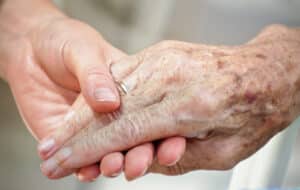
However significant changes in the skin, discoloration, and other skin changes could be indications of medical problems that seniors need to have checked out by a doctor. Skin cancer, circulatory disease, and other issues can cause skin changes in seniors. Seniors should get a medical checkup if they start to notice any of these skin changes:
Extremely Dry Skin
Dry skin by itself is normal, especially during the winter when hot indoor air and cold dry outdoor air combine. Seniors tend to have dry skin because as seniors age their skin produces less oil which means skin is drier. However, having severely dry skin can make seniors more prone to infections which can get serious quickly. If over-the-counter lotions aren’t stopping a senior’s dry skin they should see a dermatologist.
Seniors should also get help from their in-home care provider to make sure their skin is moisturized daily and that the air in the home isn’t too dry.
Itchy, Scaly, Or Cracked Skin
Similar to dry skin it’s common for seniors to get itchy skin in the winter. But if seniors are itchy and can’t get relief from their itchy skin that’s a problem. It’s also a problem if seniors develop scaly skin, rashes, or cracks in their skin because of the risk of infection. Scaly or itchy skin can also be caused by eczema, which requires treatment by a doctor.
If the itchy patches become thick, red, or purple that could indicate that your senior parent has psoriasis. Psoriasis can cause arthritis if left untreated, so seniors who have itchy skin should see a dermatologist.
Persistent Bruising
Bruising is common as seniors age because of the natural changes in the skin. However, if your senior parent is getting a large number of bruises that seem to appear for no reason that’s a cause for concern. It’s also a concern if your senior parent has bruises that are not healing. Bruising means that there is bleeding in the body, and if that blood isn’t clotting properly that could indicate a more serious medical problem.
Flat Dark Spots
Flat dark blotchy spots, sometimes called liver spots, are rarely skin cancer. They can be unsightly, but in almost all cases they’re nothing to worry about. However, if the spot changes in size or color your senior loved one needs to see a dermatologist right away.
Large or Angry Skin Tags
Skin tags are caused by loose folds of skin rubbing together, so they are a common problem for seniors. And most of them are harmless. But skin tags can also be an early sign of skin cancer. If your senior parent has skin tags that change in size or color, and are very large, red, or angry-looking make sure your senior parent gets to a dermatologist to get screened for skin cancer.
If you or an aging loved one are considering In-Home Care in San Francisco, CA, please contact the caring staff at Aviva In-Home Care today (415) 463-1400
Aviva In-Home Care provides exceptional senior home care in the Bay Area, including San Francisco, Burlingame, San Mateo, Hillsborough, Atherton, Menlo Park, Palo Alto, Berkeley, Lafayette, Orinda, and surrounding areas.
- What You Should Know About Caring For A Parent With Alzheimer’s - May 23, 2025
- How To Help Your Senior Parent Feel Their Best Every Day - May 14, 2025
- Preventing Falls in the Yard - May 6, 2025




